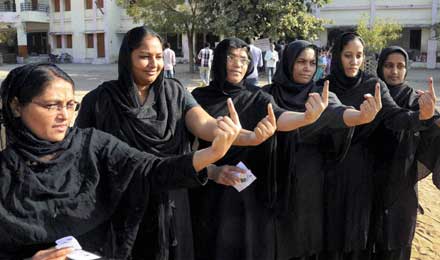
Godhra, December 14: A decade after Godhra provided the spark that ignited almost the whole of Gujarat into a communal cauldron, this relatively underdeveloped constituency in the prosperous state remains deeply divided along religious lines.
Going to poll in the second phase on December 17, the Muslims, who have a large presence among the 2.13 lakh electorate, are still not ready to forget and forgive the 2002 communal carnage, notwithstanding Chief Minister Narendra Modi's much publicised "Sadbhavna Mission" and numerous other overtures to woo them.
Amid the seemingly unbridgeable chasm, voters of this constituency, nearly 150 km from capital Gandhinagar, will decide the fate of eight candidates, including sitting Congress MLA C K Raulji who has thrice won the seat in 1990, 1995 and 2007, contesting as Janata Dal, BJP and Congress nominee respectively.
He is locked in a triangular fight with BJP's Praveensinh Chauhan, son of sitting MP from Panchmahal, Prabhatsinh Chauhan. Praveensinh is a political novice and is contesting an election for the first time.
Also in the fray is Girwatsinh Solanki of Gujarat Parivartan Party (GPP), a BJP breakaway faction headed by former Chief Minister Keshubhai Patel.
Though poll watchers are not giving independent candidate Rameshbhai Patel much of a chance, the realtor from Surat, a moneybag, is also in the fray, banking on the politically influential Patel votes.
The Muslims, with nearly 45,000 votes, have been exercising their franchise, almost en bloc, for Congress since 1962 when the first assembly polls were held after bifurcation of Bombay Presidency into Gujarat and Maharashtra.
Congress candidates have won the seat in five of the 11 assembly elections held in the state. However, Muslim candidates have bagged the seat only four times with Abdulrahim Ismail Khalpa alone winning in 1975, 1980 and 1985.
Four Muslims had filed their papers as independent candidates this time too but all of them withdrew at the last moment.
"Godhra is a prestige issue for Narendra Modi. So, he fielded Muslim candidates to divide Congress votes but Congress made sure they backed off," says Firdausbhai Kothi, president of the Muslim Ganchi Samaj Panch and owner of Kothi Steel Limited.
Kothi had sheltered hundreds of Muslims when Gujarat burned in communal strife for months in 2002.
"Muslims can make or mar the electoral fate of a candidate in Godhra but this time they stand divided. There can be a three-way split in the votes with Congress, Independent Rameshbhai and, to some extent BJP, being the beneficiaries", he said.
Asked why some Muslims would vote for BJP as the chasm remained as wide as ever, he says "they (Muslims) have forgotten the families of those convicted and sentenced to death for Sabarmati Express fire tragedy. Jamat-e-Islamia collects donations to sustain their families. Money plays a big role in elections these days."
58 people, mostly Karsevaks returning from Ayodhya by Sabarmati Express train, were burnt alive allegedly by Muslims living near Godhra Railway Station on February 27, 2002, throwing Gujarat into a spiral of communal violence which took months to ebb away and left more than 1000 killed and many times more maimed and scarred for life.
"The Congress candidate is not good but he will win," says Osmanbhai, a tailor, who feels BJP's Praveensinh, given his inexperience, is not a formidable challenger .
"The weakness of one becomes the strength of another," he says broodingly.
Godhra, the headquarters of Panchmahal district, has a history of communal violence. In 1980, five members of a Sindhi family, which had migrated from Pakistan during the Partition, were burnt alive at Muslim-dominated Signalfalia.
Their's was the lone Hindu family in the area and oldtimers say Muslims wanted them to vacate their house and leave.
"In the wake of rioting that had ensued, Godhra was under curfew for nearly six months," says Pradeep Soni, a teacher.
In 1990, four Hindu teachers of Saifia Madarsa in Vorwad area of Godhra town were killed by Muslims, he says, adding, "the mistrust between the two communities runs very deep and Modi's goodwill mission cannot bridge the divide."
Modi, who has spent quite some time in Godhra running RSS 'Shakhas' as a 'Pracharak', has made several overtures to Muslims.





Comments
Add new comment